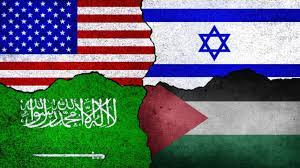16/8/2023
The chatter about Saudi-Israeli rapprochement have noticeably increased in recent weeks, especially now there is interest for the current American administration to achieve this diplomatic coup in their final year in the Oval Office so it can be promoted by US Democrats as a historic diplomatic normalization agreement. According to US National Security Adviser Jack Sullivan, the opening of the airspace over Saudi Arabia for civilian flights from Israel is one of the most tangible steps that have been achieved.
At the same time, it is interesting to see the first-ever Saudi appointment of an envoy to the Palestinian Authority, which brings Riyadh to the centre of the Palestinian issue as well. Although, the Saudis seem to have a different approach from previous attempts at normalization with Israel that Arab countries in the Gulf have tried. Previous attempts have focused on the relation between Israel and Arabs without mentioning the Palestinians, but the Saudis are insisting on keeping the Palestinian issue on the agenda.
This approach will not be comfortable for a government like Netanyahu’s who has leveraged the imposing potential of peace with Arabs rather than with the Palestinians. But peace with Saudi Arabia cannot be compared to any other agreement with Arab countries as they are the biggest and most important Arab country, the leader of the Sunni world and the official player in the Arab peace initiative. They also enjoy strategic geography and a strong economy that Israel will always consider in its attempts to make this deal happen.
This new Saudi approach will also influence the concept of the Abraham Accords that was used in previous peace deals. While the idea will not disappear, it is less influential as a tool to normalize relations. The Saudi model will focus more on politics rather than religion, which explains why the Saudis, as the leader of the Arab Peace Initiative are focusing on engaging with all Palestinians parties.
Observers of regional dynamics have noticed a new Saudi attention on the Palestinian issue. Demonstrated by Palestinian President Mahmoud Abbas visit to Riyadh for meetings with Saudi Arabia’s King Salman and Crown Prince Mohammed Bin Salman last April. It was also interesting to see the Saudis inviting high profile members of Hamas including Ismail Haniyeh and Khalid Mashal to visit Saudi Arabia and do Umrah to Mecca during last Ramadan and some believe that a delegation from the Islamic Jihad movement was also invited.
The return of Hamas to Saudi Arabia is significant and gives the Saudis more leverage in Palestine, and may also close a chapter of political dispute with the Muslim Brotherhood, which will give the Saudis a better position to negotiate based on their strategic interests.
Some argue that the issue of the Arab Peace Initiative is an obstacle to improved Saudi-Israeli relations as an important Saudi condition that is difficult to implement. But this initiative is always subject to amendments that suit the current situation, much like it was in 2002. This requires more Saudi engagement with Palestinians factions, and an understanding from the Israelis that this is the pathway for any new peace deal.
Dr. Amer Al Sabaileh
16/8/2023

